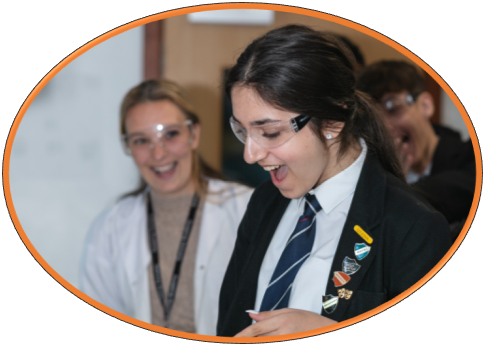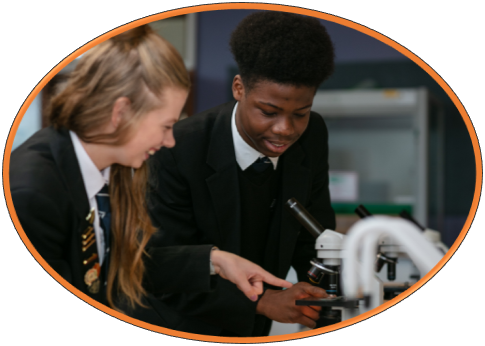Science

Curriculum Overview
 Students will have the opportunity to learn about the fundamental building blocks of life and the universe through studying different aspects of Biology, Chemistry and Physics throughout Years 7 – 11. Students will begin to think scientifically in order to better their understanding of the world around them and make decisions based on objectivity. Students will experience both practical and theoretical activities in order to challenge, stretch and progress.
Students will have the opportunity to learn about the fundamental building blocks of life and the universe through studying different aspects of Biology, Chemistry and Physics throughout Years 7 – 11. Students will begin to think scientifically in order to better their understanding of the world around them and make decisions based on objectivity. Students will experience both practical and theoretical activities in order to challenge, stretch and progress.
Intent
Science is fundamental to understanding our world through observation, experimentation and enquiry.
Implementation
Teachers will:
- Model how to be a scientist at every opportunity;
- Develop a coherent scheme of work that integrates the disciplines of biology, chemistry and physics. This will include areas such as:
- Living thing: plants, animals and humans;
- Evolution and inheritance;
- Investigation of materials;
- Forces and the physical world [including the earth’s movement in space, electricity etc];
- Plan lessons allowing for a wide range of scientific enquiry, including the following:
- Establish a hypothesis;
- Undertake comparative and fair testing;
- Research using secondary sources;
- Observe and accurately record data to obtain results over time;
- Seek patterns, classify and group;
- Analyse data to draw conclusions and evaluate the process;
- Systematically plan and teach students to understand and use correct scientific vocabulary; to talk confidently and to apply their literacy and numeracy skills;
- Ensure that all students know how to access all parts of the curriculum safely;
- Effectively integrate key knowledge about influential scientists where most meaningful;
- Employ technology and resources in the classroom to enable students to work scientifically and to bring the curriculum to enhance the curriculum.
Impact
Students will:
- Have a detailed knowledge of the fundamentals of science and will secure the skills needed to be a scientist and as a result, will achieve well;
- Recognise the positive impact that science plays in their lives in areas such physical and sexual health, reproduction and sustainability;
- Understand that the only way to solve the major issues facing the human race and the planet is to work collaboratively through science to find solutions;
- Demonstrate a lifelong love of science.
Staff:
| Mrs L Kelly (Director of Science and Maths) | lisa.kelly@theglc.org.uk |
| Miss R Horn | rozanne.horn@theglc.org.uk |
| Miss C Smith | charlotte.smith@theglc.org.uk |
| Miss M Moon | michaela.moon@theglc.org.uk |
| Miss N Gazzard | natasha.gazzard@theglc.org.uk |
| Mrs K Hardey | kim.hardey@theglc.org.uk |
| Mr M Prince | michael.prince@theglc.org.uk |
| Miss N Kanyi | nkaye.kanyi@theglc.org.uk |
| Mr T Dhedli | tarun.dhedli@theglc.org.uk |
| Mr S Blake | sam.blake@theglc.org.uk |
| Miss A Edwards (Science Technician) | amy.edwards@theglc.org.uk |
GCSE EXAM PAPERS
Copies of GCSE exam papers on this subject can be found below. Please click on the title of each past paper to download, view and complete these. Be sure to review them for valuable practice and insight into the exam format.

